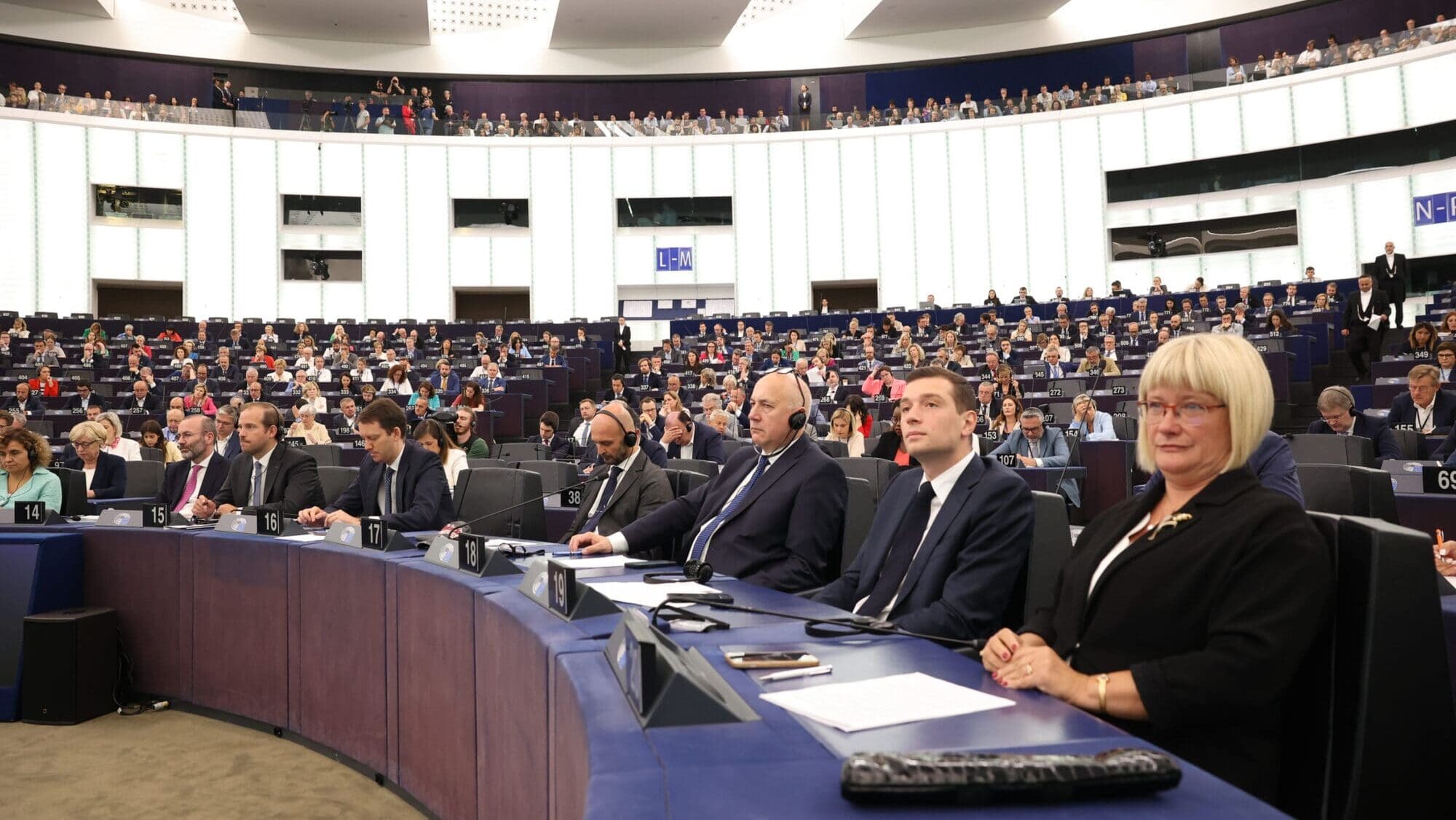
Patriots’ First VP Kinga Gál (right), and Chairman Jordan Bardella (second from right) in the Strasbourg plenary.
Photo: Alexis Haulot © European Union 2024 – Source: EP
The European Parliament held the constitutive meetings of its parliamentary committees on Tuesday, July 23rd, and the same deal was implemented in each of them: the mainstream center-left coalition stripped every single candidate of the national conservative Patriots for Europe (PfE) of their allocated leadership positions, even at the expense of violating the Parliament’s own internal rules.
In their press conference shortly after, the Patriots’ leaders vowed to challenge this “shameful pact” through all legal means possible. “It clearly shows that they are not prepared to accept democratic election results and the fact that the Patriots are the third largest group in the European Parliament,” the group’s First Vice President, Kinga Gál (Fidesz) said.
⚠️ In view of the results of the EU elections, our Group (@PatriotsEP) was entitled two committee chairs and several vice chairs. Nevertheless, all candidacies of our MEPs were voted down today by a coalition of the Socialists, Greens, Liberals and the European People's Party. pic.twitter.com/uQD5QGcPgu
— Patriots for Europe (@PatriotsEP) July 23, 2024
The leadership of the parliamentary committees (subdivisions specializing in certain policy areas) is made up of a chairman and four vice chairs, who are usually elected by the committee members the week after the new Parliament is created.
Normally, the vote should only be a confirmation of candidates, as the posts are automatically allocated proportionally based on the relative sizes of the groups. The groups then only have to care about nominating candidates that keep the gender balance, as the Parliament’s rules require.
This time, however, the leftist groups—led by von der Leyen’s (nominally ‘center-right’) EPP—joined forces to cheat the system. The majority (including even the far left) simply voted down every Patriot candidate and split up their previously allocated two chairmanships and eight vice chairs between themselves. All the time, they acted as if violating every convention laid down in the treaties was perfectly legitimate if it was done against conservatives.
❗️@POLITICOEurope published a document on the EP committee positions. Read the explanation of the light blue color (last sentence). How do they dare? Predators! House of #antidemocracy. https://t.co/5RnCxcT0uf pic.twitter.com/z634YRvDie
— Enikő Győri (@GyoriEniko) July 19, 2024
“What we have witnessed here today, the behavior of the political groups on the Left and the EPP, is outrageous and unacceptable,” Gál said afterward. She highlighted that the leftists even had to violate the gender quotas that they themselves had established just to prevent the Patriots from taking a single seat.
“This is a rejection of 18 million voters and a betrayal of democracy,” Gál said.
But the fight is only just beginning. The Patriots vowed never to accept this “shameful” outcome and to explore “all available legal remedies” to challenge it internally as well as at the European Court of Justice (ECJ) if need be.
“Everything that happened here is going against Rule 216,” Gál said, referring to the EP’s internal rules of procedure, which say that the composition of the committees “shall, as far as possible, reflect the composition of the Parliament” and that the groups “should strive for a fair gender representation.”
The same rule also says that, if there is no agreement between the political groups, the matter shall be decided by the Conference of Presidents, a mediating body comprising the heads of the political groups where every group has equal weight, regardless of their size. But as national conservatives are outnumbered there three to five, it is unlikely that they would receive any positive result.
The chances are even worse in the Parliament’s Bureau—the EP President and her 14 Vice Presidents who oversee the entire institution. The same cordon sanitaire was applied there during the Strasbourg plenary last week, and the Patriots—despite being the third-largest group—were denied a single seat at the table while the election-loser liberals and greens, and even the radical Left group, were given several vice presidencies.
The four-party coalition (EPP with the losers, ie. SD, RE and Greens) that elected #vonderLeyen keep neglecting rules and traditions.
— Enikő Győri (@GyoriEniko) July 23, 2024
For EPP cooperation with the communists is no longer a problem. I doubt their voters will honor that.
Turning to the ECJ might be the ultimate option, but we should not expect any quick resolution coming from the Strasbourg court either. For one, it might take years until any ruling is issued. Second, this unprecedented and undemocratic cordon sanitaire is legitimized by Ursula von der Leyen herself, and the ECJ is unlikely to rule against her and the Commission’s interests.
Nonetheless, the Patriots still remain hopeful, partly because at least one of the national conservative groups, Giorgia Meloni’s European Conservative and Reformists (ECR) has fully broken out of their partial cordon sanitaire in the last term.
Despite being only the fourth-largest group, ECR was given two EP vice presidencies, three committee chairs, and ten committee vice chairs, therefore significantly increasing their influence in Brussels. The Greens and socialists, of course, tried to prevent the election of several ECR candidates, but all of them passed in the end with the help of the Patriots and the EPP.
Naturally, the ECR is viewed as the primary prospective ally of the Patriots. As Gál suggested, “one good alliance” with the ECR might be enough to see “changes at the mid-term,” as all of parliament’s top positions need to be re-elected in 2.5 years.
Today in the European Parliament we voted for the election of the Chairs and Vice-Chairs of the Committees. The red and green leftists tried 13 times to buck our candidates. Sometimes by a single vote, sometimes by a larger margin: they lost 13 times. I would like to thank all my… pic.twitter.com/EePUvKx23L
— Nicola Procaccini (@NProcaccini) July 23, 2024
